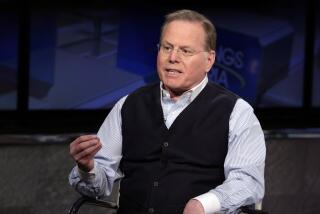AT&T;’s Mandl Resigns to Head Wireless Venture
- Share via
WASHINGTON — Alex J. Mandl, widely considered to be next in line for the top spot at AT&T;, abruptly resigned as president of the telecommunications giant Monday to lead a new wireless communications venture.
The departure of Mandl, 52, for Associated Communications, which aims to develop wireless voice and high-speed data services in major metropolitan areas, marks the latest round in a game of management musical chairs now gripping the fast-growing telecommunications industry.
Seasoned executives have been besieged by start-up companies offering equity and bonus packages and management autonomy that big public companies are hard-pressed to match. Although the chairmanship of AT&T; traditionally would have been a prize appealing enough to keep any executive in place, entrepreneurial opportunities can now be even more appealing.
Although Mandl would not disclose his new salary, sources told the Washington Post that it includes a $20-million payment, a $1-million annual salary and stock options amounting to as much as $180 million for every $1 billion in growth the company experiences.
Last year, James Barksdale left a senior position at AT&T; to join Internet start-up Netscape Communications. Another former AT&T; executive, David R. Schmieg, recently resigned as senior vice president at Sprint to head up a new communications venture called Windstar Communications. Dozens of lower-level executives have made similar moves.
“People do look to companies like AT&T; when they are trying to staff their organizations,” said Richard Miller, AT&T;’s chief financial officer. “You never expect to lose certain individuals, but you know over time you are going to lose some. . . . There’s no exodus . . . [but] right now it’s a very relevant issue.”
Mandl was the chief architect of AT&T;’s $11.5-billion acquisition of McCaw Cellular Communications in 1994 and had headed the company’s long-distance business and its online and multimedia ventures before becoming AT&T;’s president and chief operating officer. He joined the company after serving as chief executive of Sea-Land Services, a major shipping firm.
Mandl’s tenure as president coincided with AT&T;’s decision last year to split itself into three companies and eliminate as many as 40,000 jobs. Although AT&T; Chairman Robert Allen drew much of the public ire for the massive layoffs, company insiders say Mandl was a key force in pushing for a leaner AT&T.;
Analysts lamented Mandl’s departure, especially because it comes as the company is gearing up to enter the local phone business--and faces the prospect of major new competition in its core long-distance business as the regional Bell operating companies enter the business.
Several analysts downgraded AT&T; stock Monday, and the shares slipped $1.375 to close at $54.125 in NYSE trading.
“The departure of Alex Mandl is a major loss,” said Mark Bruneau, managing partner at C.M. Management Systems, a telecommunications consulting firm that has done work for AT&T.;
“People are in shock,” said one AT&T; executive, who did not want to be identified. “People are saying, ‘Why would the No. 2 guy bail at this critical time in the company?’ ”
Alex J. Mandl
Executives at other large telephone companies say such departures are becoming more common amid increasingly aggressive recruiting by rivals and new communications start-ups.
“We haven’t lost any top executives yet . . . but we’ve had a lot of people leave much farther down in the organization,” said Frank Walter, a spokesman for MCI. “It [has stemmed from] a combination of start-ups and local phone companies that have been increasingly aggressive in recruiting.”
Associated Communications aims to use point-to-point microwave and cellular phone-style wireless communications technologies to provide voice, high-speed data, Internet access and videoconferencing services in Los Angeles, San Francisco and 29 other major metropolitan markets around the country by the middle of next year.
The new venture is a unit of Associated Group of Pittsburgh, a publicly traded company headed by former cellular telephone executive Myles P. Berkman.
In 1983, Berkman sold his cellular operations, then the nation’s 14th-largest, to SBC Communications in a transaction valued at $700 million. Associated Group now has interests in international wireless telephone, radio broadcasting and cable television.
Mandl “is a strong organizer who was quick to grasp the tremendous market opportunity that this business represents,” said Berkman, chairman of Associated Group. The venture is co-owned by Telecom Ventures, a relatively unknown company backed by Carlyle Group, a venture capital firm, and the Singh family.
Shares of Associated Group jumped $4.75 to close at $29.50 on Nasdaq.






